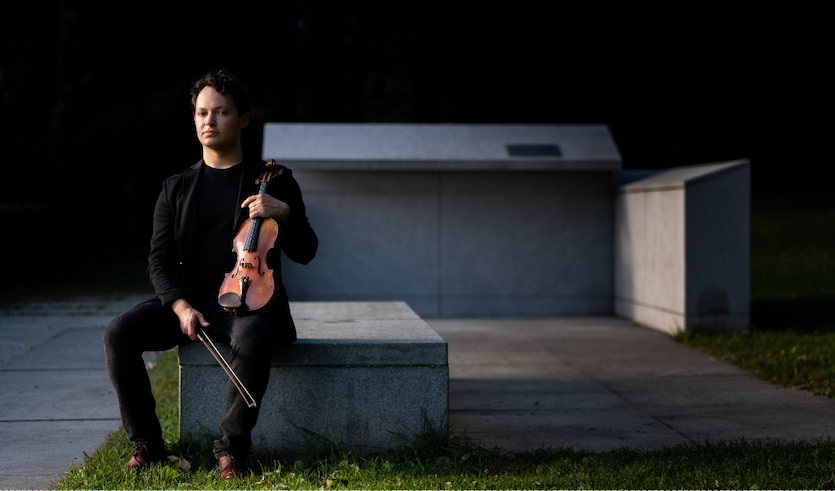Violinist Yevgeny Kutik Tells His Family’s Story With Words And Music In Docu-Recital Series
"Finding Home: Music From The Suitcase In Concert" weaves music and storytelling by the Russian-American violinist.

"Finding Home: Music From The Suitcase In Concert" weaves music and storytelling by the Russian-American violinist.

We waited in Italy for six months, stateless, penniless, looking toward to a future we didn’t know. Each evening, we gathered with scores of other refugees in the town square. I remember sitting on my father’s shoulders looking at the refugee agency calling out the names of the refugees who had received invitations from sponsors to settle in the United States. One night, in the town square, our name was called. We were going to Pittsfield, Massachusetts, they told us. We had never even heard of Massachusetts, let alone Pittsfield.
So relates Russian-American Violinist Yevgeny Kutik in “Finding Home: Music From the Suitcase in Concert,” a five-episode online docu-recital series. It’s premiering tonight at 7 p.m. and every Thursday through March 11 on Kutk’s Facebook and YouTube channels. Accompanying Kutik is pianist Anna Polonsky, a fellow Russian emigre.
Kutik was five years old when his family fled the Soviet Union, a hotbed of rabid anti-Semitism. They had their share of horror stories, inflicted upon them because they were Jews. When they left, in 1989, each person was allowed two suitcases, and his mother, a violin teacher, filled one of hers with sheet music from the family’s collection. That music was the basis of Kutik’s 2014 album, “Music from the Suitcase: A Collection of Russian Miniatures,” which debuted at No. 5 on the Billboard Classical chart and was featured on NPR’s All Things Considered and in the New York Times. The album became the springboard from which Kutik has created this video series. Punctuating the ravishing music is his narrative of a melancholy yet hopeful story, translated through his deeply felt playing, which the New York Times has called “an old-fashioned, rhapsodic style….magnified by his rich, sweet tone.”
This project, of course, is as personal as they come, and an outcome of the pandemic.
“Covid canceled everything I had planned,” he says. “I started thinking about what I can be doing right now. I was desperately searching for a creative outlet. The 'Music from the Suitecase' CD did very well, and I’d been invited to present recitals based on that music. The video series could bring the music and my story to all the people who were planning to come to the concerts that got canceled.”
At the start of the pandemic, the Boston resident and his wife temporarily based themselves at home with his family, who now live in Lenox. He had time to talk to them in more detail about their experiences in the Soviet Union and their journey to the United States. Learning some things for the first time, he was able explore more deeply into his own past.
The five episodes, filmed at the Shalin Liu Performance Center in Rockport, Mass., revolve around themes of “finding home,” as Kutik explores anti-Semitism in the Soviet Union, his family’s months as “stateless” refugees, the amazement and challenges of starting a new home in the United States, his teachers and mentors, and lessons for the future. Between pieces, Kutik speaks directly to the viewer, each episode advancing his and his family’s stories.
With his story fleshed out, the music for the series also goes beyond what’s in the CD.

Photo: Griffin Harrington
“I’m trying to move past the suitcase,” Kutik says. “I’ve included some music that has meaning to me,” music that reflects on the teachers who helped mold him as a musician. The piece by Franck, for instance, was one he studied with his first teacher — his mother, Alla Zernitskskaya, Pittsfield High School’s esteemed orchestra teacher. The Milhaud calls to mind his beloved long-time teacher, violinist Roman Totenberg (“my musical father”). All told, the repertoire summarize his musical journey.
Kutik, who holds a bachelor’s degree from Boston University and a master’s degree from the New England Conservatory, made his major orchestral debut in 2003 with Keith Lockhart and The Boston Pops. In 2019, he made his debut at the Kennedy Center, and was performing at major music festivals when the pandemic hit. His previous albums, Sounds of Defiance (2012), Words Fail (2016), and Meditations on Family (2019) have all received critical acclaim.
It’s clear that Kutik is passionate about his heritage as well as his family’s experience of going from stateless to rebuilding a life and a community. He is an advocate for the Jewish Federations of North America, the organization that assisted his family in coming to the United States. Although he was only five when he left Minsk, Belarus, the immigrant experience still resonates deeply in his musical and nonmusical being.
“When I was creating this series, Belarus was in the news daily — all the protests and mass arrests.,” he says. “That it was happening when I was going through this personal exploration of my roots was a little bit surreal.”
“Finding Home: Music from the Suitcase in Concert” is free to watch; registrants will be emailed the links to watch each week. Kutik will answer questions in the chat during the Thursday premiers and each episode will be available for on-demand viewing.